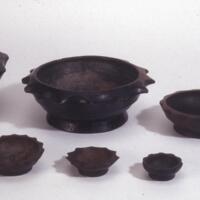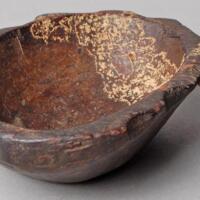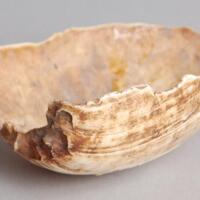Bowl
Text
Rice bowl made of wood.
(Production ethnic group): Made by: Igorot, Made by: Ifugao
Share this
Media
Images
Map British Museum
Metadata
Publisher
The British Museum
Date
1850s-1910
Identifier
As1914,0414.10
Origin
South East Asia, Philippines, Luzon, Cordillera Administrative Region, Ifugao, Kiangan
Materials
wood
Physical Dimensions
(H) 3.40 cm x (W) 7.20 cm x (D) 6.80 cm x (Wt) 34g
Provenance
Mrs Turnbull
Acquisition Date
1914
Short description
"Rice bowl made of wood"
Display status
Currently not on display (Exhibition history) 1996-97, London, Museum of Mankind, 'Stairways to the Sky: Rice and Life in the Philippines'
References
Additional notes: From acquisition notes "Igorrot; Ifugao".
Register says: "This whole collection from the "Igorrot". N. Luzon." Register says: "Rice bowls. "Ifugao" tribe. Kiangan. N. Luzon, Philippine Is. All the people of the Kiangan region are called "Ifugao" by the Boutoc Igorrot. [see Publ. Kon. Ethnic. Mus. Dresden. A.B. Meyer. Vol. VIII. 1890., pl. XIV.4]"
Register says: "This whole collection from the "Igorrot". N. Luzon." Register says: "Rice bowls. "Ifugao" tribe. Kiangan. N. Luzon, Philippine Is. All the people of the Kiangan region are called "Ifugao" by the Boutoc Igorrot. [see Publ. Kon. Ethnic. Mus. Dresden. A.B. Meyer. Vol. VIII. 1890., pl. XIV.4]"
Official Website
Collection
Cite this Page
“Bowl,” Mapping Philippine Material Culture, accessed April 20, 2024, https://philippinestudies.uk/mapping/items/show/2655.
Geolocation
Sensitive Content
Mapping Philippine Material Culture collates digital material from institutions, and some of this material is inherently colonial and contains words, terms and phrases that are inaccurate, derogatory and harmful towards Filipino and Filipino diasporic communities. Catalogue transcriptions, book titles, exhibition titles and museum titles may contain harmful terms. We recognise the potential for the material to cause physical and mental distress as well as evoke strong emotions. Owing to the scale of the collection’s data, a process to implement sensitive-content warnings in the displayed data is still incomplete. The material within the catalogue does not represent Mapping Philippine Material Culture’s views. Mapping Philippine Material Culture maintains a strong anti-colonial, anti-racist position and affirms its support for centring the humanity of historically marginalised and disenfranchised communities.
Facebook Twitter


